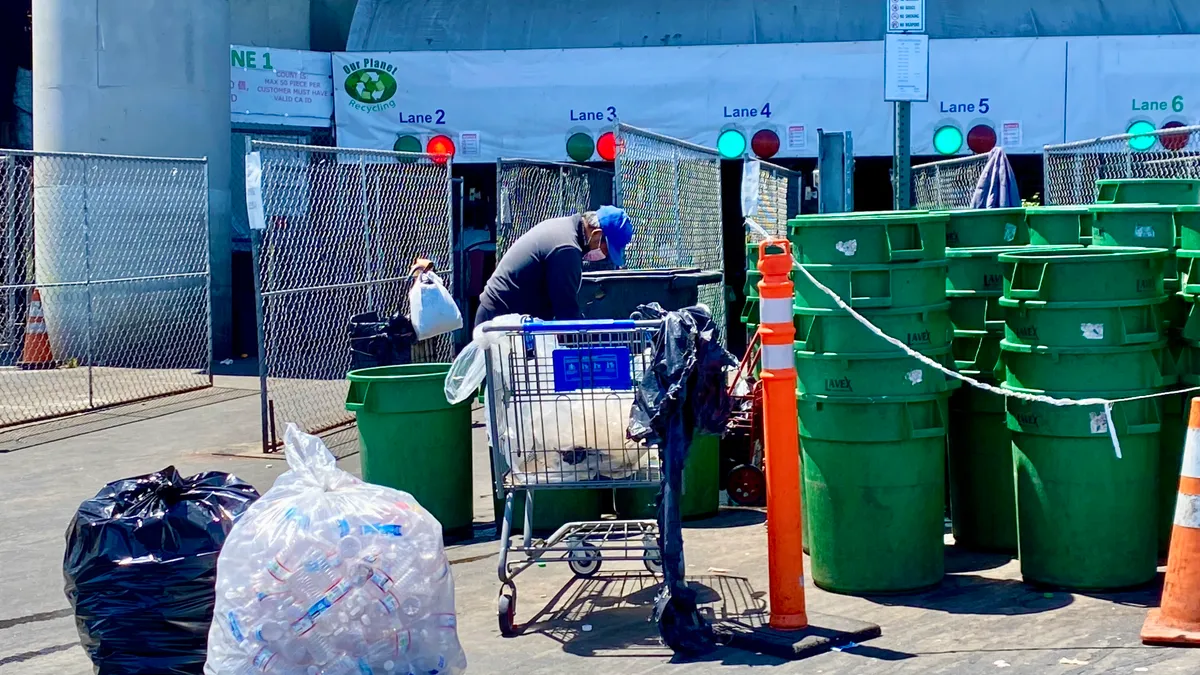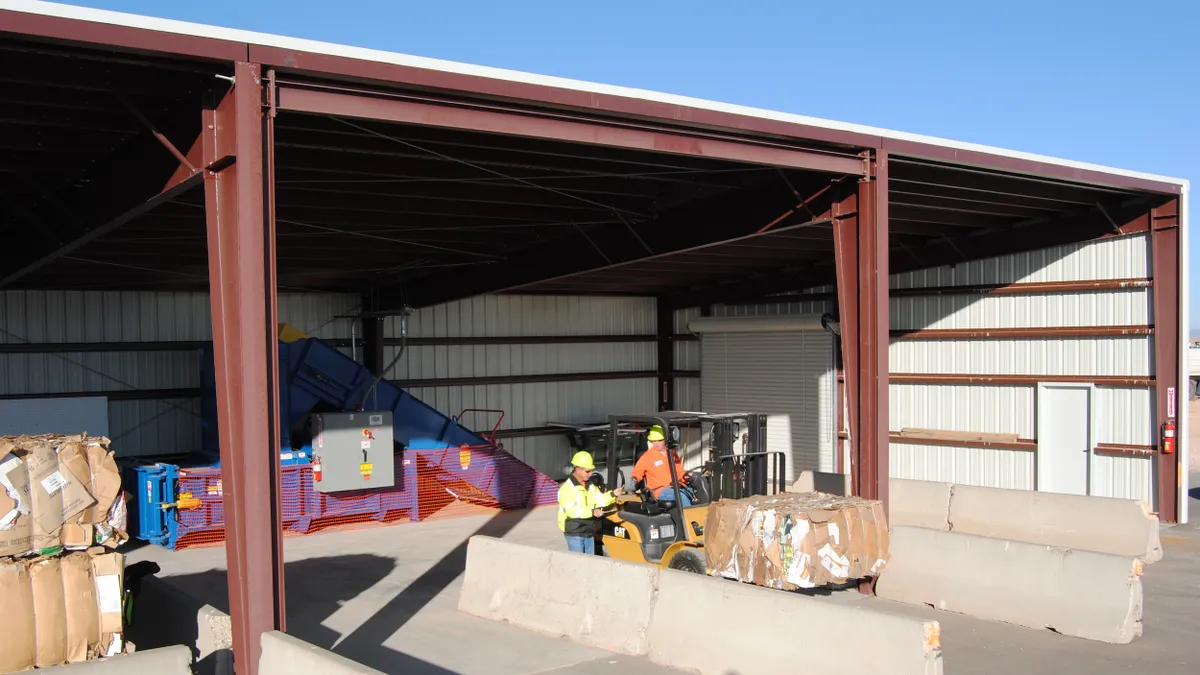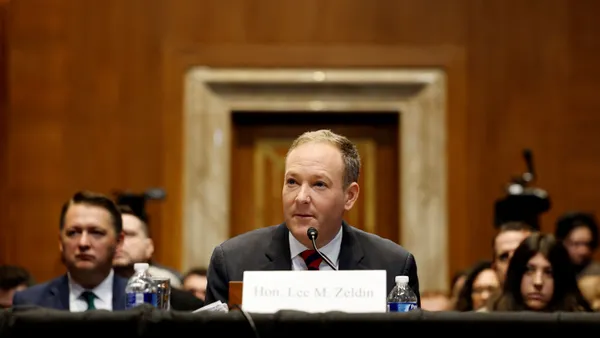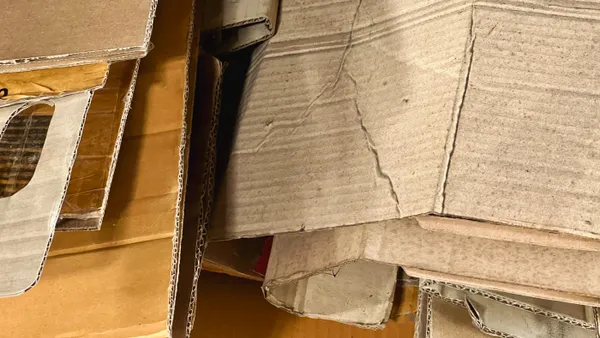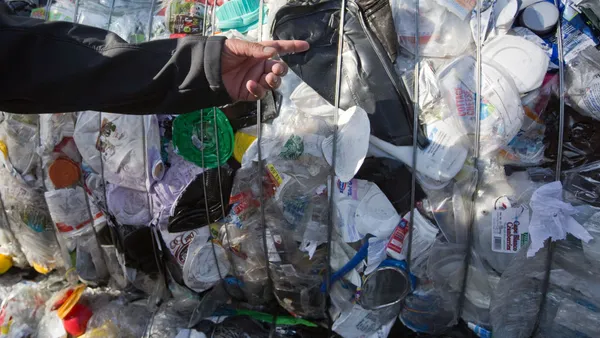Rubicon Global has generated more outside interest in the waste industry than any other company in recent years due to one prominent tactic: vowing to transform it entirely.
Since it was founded in 2008, the Atlanta-based technology company has grown to serve major clients in cities around the country through a network of thousands of independent haulers. They have attracted many high-profile investors and a series of articles proclaiming their potential to "disrupt" the waste world. The company's name comes from Julius Caesar's march across the Rubicon River to conquer Rome, and they have a similarly bold mission to change the waste industry.
The company's CEO Nate Morris, 36, has been at the forefront of this charge. He attributes his success so far to a "working class background" in Kentucky — relating to a part of the country that he feels is often overlooked — and bringing a more modern understanding of technology to an industry that has been wary of change.
Yet, until a few key announcements from the company, some in the industry were still unsure of what this promised disruption might look like. Waste Dive spoke to Morris to find out more about Rubicon's plans and his thoughts on what needs to change in the industry.
WASTE DIVE: A lot of articles have called Rubicon "the Uber of trash." Is this a fair comparison?
MORRIS: I have to take it as a compliment for our business and for our team, because I think today Uber speaks for the new way that the industrial economy will evolve. It speaks for a story around technology and its value in the industrial economy. I don’t think it always entirely encapsulates all of our model, because we do so much more than Uber. As far as data collection, the way we empower our haulers, the way we’re dealing with environmental challenges and actually collecting data around those environmental challenges. So I think it’s the way the girl or guy on the street would maybe understand what the model is about related to using technology to bring together thousands of independent haulers. But I don’t think it quite does it justice.
There are other companies with fleet management software and waste technology platforms out there. How do you differentiate Rubicon from companies that are doing similar work in the industry right now?
MORRIS: For us, more valuable than the revenue we create as a business is the data we collect. It's going to allow the industry to be able to plug into things like artificial intelligence, machine learning, and to be a modern source of problem solving for today’s supply chain. If we look at the big players in the industry, as you know, they’ve grown through acquisition. So that creates a tremendous challenge for these companies in the future. Because at the time of making the acquisition they were focused only on creating more revenue and synergy. But they were acquired at a time when data wasn’t as important and wasn’t as focused upon. So for us, having one source of truth around all the information, being able to start from a clean slate, and not having the legacy challenges that the big players do, that I believe will allow Rubicon to win in the future.
Rubicon recently announced a major partnership with the French company Suez. How can we expect to start seeing Rubicon become more active in European markets?
MORRIS: We’re incredibly excited about the Suez partnership, and it doesn’t change our business here domestically or even abroad. I think it only enhances the way we work with our current customers in offering more solutions to them and more knowledge, and certainly more financial backing as well.
The CEO of Suez called me back in the summer ... and I was very intrigued. Suez shared with me that they would like to move to a similar model and I was immediately struck by that. Because folks in our space, the big guys at least, would say that Rubicon is just a broker or "they don’t have anything that’s interesting." I think having Suez see the potential and the opportunity, that to me was very revealing that we could have a true partnership that’s focused on our goal of getting off the landfill model and also moving to a model that’s driven by technology. That to me made a lot of sense, but I think it’s also a tremendous opportunity for Rubicon. We service many of the Fortune 500 companies and many of them have needs abroad. So that’s going to open up the sphere of opportunity for us to serve those customers in a way that even Waste Management and Republic Services can’t. So I think’s that incredibly powerful.
The European Union has moved farther away from the landfill model through taxes and other measures, while the U.S. is still more landfill-centric. Do you think Europe's approach is more in line with the Rubicon model?
MORRIS: It is. And I think if we were to look at Europe we would see clues to where the American system will be going sooner rather than later, at least from a consumer demand side. What I find fascinating is that sustainability reports have been filed in Europe since the early ‘90s as a mandate. If you’re a publicly traded company you have to file that sustainability report. Today in the United States for public businesses it’s a voluntary measure. Which is certainly fine, but the millennial generation is getting more and more buying power and they’re now demanding [that] companies disclose their sustainability metrics. It's been the key driver in their purchasing decisions.
I tell people all the time that we built this business for the millennial generation. We will own that demographic and people of that demographic will ask the question, I believe, “Are you using Rubicon for your waste and recycling?” And if not they’re going to know that they’re aligned with a model that’s solely incentivized to fill up landfills and not to do the best thing for small business and the environment.
"We built this business for the millennial generation."

Nate Morris
CEO, Rubicon Global
I know that landfill diversion is a big focus for Rubicon, but do you see a role for waste-to-energy if diversion has been maximized first?
MORRIS: My belief is that any time we can create value from waste it’s a good thing, other than just burying it in the ground like the major firms do. There’s a school of thought that waste-to-energy is not a closed loop solution. We judge zero waste metrics around what is closed loop. So for us, under our key indicators, we would not give waste-to-energy full credit as being a diverted solution from landfill. That’s what we’re after to get to our clients’ goals and to get to our personal mission as a company.
How is Rubicon helping independent haulers stay competitive against larger companies in terms of infrastructure costs and what do you see for these smaller companies in the future?
MORRIS: Rubicon is a conduit for revenue that they wouldn’t be able to win by themselves. This is our national customer base. If you’re the independent hauler you get displaced from those national discussions because you don’t have a national footprint. We look at our hauling community as a customer and we want to treat them like a customer ... We’ve had several haulers that have expanded into new markets as a result of Rubicon. If you’re in North Carolina we want you to go to South Carolina, we want you to go to Virginia. Or if you’re in Texas we want you to go to Oklahoma and Arkansas... We're going to continue to partner with the independents and help them build their businesses and ultimately fight Waste [Management] and Republic.
Even with that financial support, low commodity prices for some materials have still made it tough for independent haulers. How does being part of the network help them better handle those materials?
MORRIS: We continue to get data about how material and volume is moving market by market. We’re then able to leverage that information to know how we can attract a solution contrary to landfill into that particular market. One of the reasons why certain solutions like anaerobic digestion have not had the scale of say a landfill is that a lot of it is information. Once that information is available, because Rubicon is incentivized to collect it, we’re then able to attract investments say from a Suez to be able to build those facilities to be able to move that material in a cost-effective way into something more sustainable than a landfill.
That’s one of the big challenges in our industry, is that you have the three big players that have owned the market nationally and they focused on landfill completely. They have no data, no technology. There’s no incentive and there’s no way for the industry to have ever evolved. Because if you don’t have the data you don’t know what solutions could be created and if you make all your money at the landfill you have no incentive to even try to find the information. So we think that that’s where the data is going to make these solutions more cost-effective in the long run.
Based on their size, I imagine that the big three companies — Waste Management, Republic Services and Waste Connections — could do something similar if they chose. Do you think that they’re not investing enough in data or they are and they’ve still decided landfills are the best for their business model right now?
MORRIS: Well, it all starts with Wall Street. The big three companies are beholden to Wall Street, and Wall Street wants their dividends. In order to achieve that dividend they’ve got to continue to feed the landfill. They can’t innovate because they have a fully baked, fully integrated model that they have to satisfy in order to make Wall Street happy. So the moment that they try to move away from their core revenue function, that’s when their shareholders go crazy. And I know Waste Management has tried it several times with no success.
I believe that if they would take a 10, 20, 30-year outlook they would see that our path is the right way for how the industry must evolve around data technology, around AI, around machine learning, but more importantly around cost savings and the environment.
Any thoughts on how driverless vehicles could affect the industry?
MORRIS: In order to get to an autonomous driverless vehicle, you have to have information. You're going to have citizens around the country in driverless vehicles, because Google, Tesla, Uber, Lyft, all these groups have been able to consolidate the information about driving patterns. What is Waste Management and Republic...doing related to autonomous vehicles? How would they evolve when you have millions of driverless cars and trucks hauling freight around the country? How would they correspond in an ecosystem like that, in a traffic pattern? That’s something that no one has ever addressed with them. You’ve got $50 billion of market capitalization that’s invested in nothing related to the way that they’re consolidating information.
What’s shocking to me is that, you know for us, we look at technology as a vehicle for safety. We know that safety should be the number one concern of every company in our space. This has been something that’s been right in front of the face of the two big companies — Waste [Management] and Republic — and we’ve heard nothing about zero touch, about what they’re doing to use data to be safer in the future.
You mentioned millennials being a big focus for Rubicon. We've see a lot of engagement from them around climate change and environmental issues, but waste isn’t often part of those conversations. What do you think it will take to get the younger generation more engaged in waste issues moving forward?
MORRIS: We’ve tried to show the challenge that we’re all faced [with] today by the amount of trash that’s being buried into the ground across every landfill in the world. Trash is an epidemic, and if this generation doesn’t do something then who will? We view that as a call to action, as a call to reach across party lines.
"Trash is an epidemic, and if this generation doesn’t do something then who will?"

Nate Morris
CEO, Rubicon Global
This isn’t a Republican or a Democratic issue, which I love. I can go in places like my home of Kentucky, where the climate debate has been very contentious, and I can show a way forward on sustainability and the environment that is cost neutral or better, that’s driven by the free market, that helps small business and gets people to change their outlook on the way they perceive the environmental movement. And that gets me really excited. We’re met with the same level of enthusiasm [by] my friends in San Francisco and New York about what we’re doing.
We believe we’re bridge builders around the way the environmental discussion continues to evolve in this country. We want to be at the forefront of that discussion, bringing people together — because it’s been far too contentious — and trying to find a solution that makes sense for business and that makes money for business. And I think if we can do that, which we’re doing, we can win.





